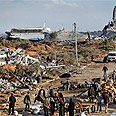
HRW's 2010 report noted Israel's 'positive movement' toward probing Gaza war
Photo: AP
The 2009 calendar year was a tumultuous one for Human Rights Watch (HRW). Following a fundraising trip in Saudi Arabia and the revelation that its senior military analyst Marc Garlasco is an avid Nazi memorabilia collector, many critics, including HRW founder Robert Bernstein, called for reform.
One such sign was evident in Iain Levine’s Tel Aviv press conference presenting HRW’s 2010 World Report. Levine focused on Israel’s
potential as a moral advocate on the issue of banning “blood diamonds” mined under abusive conditions in Zimbabwe. He also noted Israel’s “positive movement” toward investigating Gaza war
operations, especially as compared to Hamas’
lack of initiative.
Although HRW officials maintain publicly that no wrong was done, there are small indications suggesting that HRW recognizes the need to restore the organization’s moral standing.
Cast Lead
Rights group rejects Islamist group's claim that it did not target Israeli civilians during Gaza war, says, 'Under laws of war nothing can justify attack against civilians, and violations by one side do not justify violations by the other'
While he repeated allegations about the “increasingly disastrous blockade of Gaza” and IDF misuse of white phosphorous, Levine also mentioned rocket attacks against Israeli civilians, brutal internal repression by Hamas under the cover of war, and the endemic lack of accountability for torture in the Palestinian Authority.
A week after the Tel Aviv press conference, HRW announced that James F. Hoge Jr. will replace Jane Olson as the chair of HRW’s board. Choosing a leader with expertise on China may signify a shift in HRW’s obsessive attention on the Middle East. Perhaps, under Hoge, HRW will devote more of its resources to substantively addressing severe human rights abuses in that emerging Asian superpower.
In contrast to HRW’s disproportionate criticism of Israel in 2009, the organization issued a more even-handed press release following the publication of Hamas’ response to the Goldstone Report: “Gaza: Hamas Report Whitewashes War Crimes” (January 28, 2010).
"Hamas can spin the story and deny the evidence, but hundreds of rockets rained down on civilian areas in Israel where no military installations were located," said Joe Stork, deputy Middle East director at HRW. This condemnation received wide media coverage.
Old habits die hard
Still, some of HRW’s old habits are apparently hard to break. When UN Secretary-General Ban Ki-moon declared that Israel’s investigation system for alleged violations of the Law of Armed Conflict is comparable to the systems in leading democratic nations, HRW quickly criticized Israel and Ban. Senior researcher Fred Abrahams accused Ban of avoiding the issue, and HRW continued to call for an “independent investigation”. Levine’s praise of “positive movement” was swept under the rug.
In parallel, HRW joined in the chorus defending the New Israel Fund (NIF), which has recently come under fire for funding Israeli NGOs that contributed to the Goldstone Report. These NGOs and the NIF launched a massive PR offensive against critics, accusing them of silencing free expression and dissent.
HRW leveraged the opportunity to attack its own critics in Israel and falsely framed the attack on NIF as part of the larger threat against “civil society,” overlooking the widespread criticism of the NIF from Israeli society at large. HRW seems to think that criticism is allowed – except when it is directed at its colleagues.
To be sure, other prominent human rights organizations also stumble on issues of moral relativism and confusing perpetrators and victims. A senior official at Amnesty International was suspended last week after she criticized her organization for allying itself with Moazzam Begg, a supporter of the Taliban. Unable to ignore the inherent contradiction between Taliban support and human rights defense, Amnesty launched an “internal inquiry” but explained that it had collaborated with Begg because he is a “compelling speaker.”
Ironically, HRW also suspended Garlasco after his Nazi memorabilia fetish was exposed, although the results of HRW’s “internal investigation” on this matter have not been made public.
Perhaps organizations such as Amnesty and HRW fear that admitting mistakes will tarnish their hallowed reputations. They therefore adhere to the “human rights abusers are attacking human rights messengers” story line. While it is encouraging that HRW seems to be working to restore the balance called for by founder Bernstein, escalating global human rights abuses call for unwavering defenders of universal moral truths. If it is to play a relevant and effective role in today’s world, HRW must be willing to take an unbiased, principled stand.
Frayda Leibtag is a researcher at NGO Monitor















